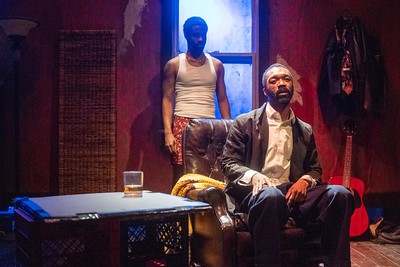By Rikki Lee Travolta
Invictus Theatre has been on a strong growth path since debuting on the Chicago storefront theatre scene in 2017.
My introduction to Invictus was with their excellent production of “The Crucible”, which earned multiple Non-Equity Jeff Award nominations and deservedly so. I invite you to read the Life and Times review of that production. That production was also acknowledged in the 2023 Heartstrings Awards.
For “The Crucible”, they packed a lot of talent and emotion into a tiny storefront. Now, delightfully, they have upped their game once again with a move to the more spacious Windy City Playhouse on Irving Park Road in Chicago.

Their first production in this new home is “Topdog/Underdog” by Suzan-Lori Parks. One of the things that I love is a swing-for-the-fences attitude.
“Topdog/Underdog” won the 2002 Pulitzer Prize for drama for its playwright. The 2002 Broadway production was nominated for Best Play in the Tony Awards. The 2022 Broadway revival won the Tony in the same prestigious category.
The highly-decorated play is a two-person drama set in urban decay that has attracted such stars as Don Cheadle, Jeffrey Wright, Mos Def, Yahya Abdul-Mateen II, and Corey Hawkins to take on its power. Clearly, it requires actors of the highest caliber to reach the bar of excellence that has been set. Invictus has two such stars in Mikha’el Amin and DeMorris Burrows.
There are few feel-good moments in this depiction of what an outsider would view as a miserable life. Yet although the play never gives you the warm fuzzies, there is a definitive current of dark humor bubbling below the surface. It swells up from time to time just enough to erupt into view, then slithers into hiding once again.

For the most part, it’s not laugh-out-loud humor. It’s humor that makes you think, and at times cringe.
Lincoln ard Booth are brothers fighting to survive in a ruthless cement jungle. No specific city is ever named. It could be any city with a ghetto sporting dilapidated boarding houses with crumbling walls and no running water.
The two African-American brothers share a room in a dirty old building. The room is Booth’s – the younger of the brothers. He’s hot-headed and psychologically troubled. His brother Lincoln is weathered and beaten down beyond his years. He has been kicked out by his wife and has turned a temporary stay sleeping on Booth’s recliner into a rather prolonged visit.
However, Lincoln is the only source of income for the two, so it is hard for Booth to justify kicking him out. Besides they’re brothers, right?
But what does that mean? For many brothers, there is at least some sense of rivalry. In these two damaged souls, there is a very bold rivalry.

Throughout the play, they battle in one-upmanship. Sometimes their blows at each other’s ego and self-esteem are sly and backhanded – done with a smile on their face yet meant to leave a scar. Other times there is an explosive intensity to the power struggle – an intensity that carries all the way through to the climax of the show.
Lincoln, as brought to the stage in Amin’s brutally brilliant interpretation, is a burned-out former hustler. Looking out through the slits of half-closed eyelids he talks in a raspy lyrical cadence that comes from a lifetime of abusing alcohol, drugs, or both. His mind more floats than moves with purpose – or so you’d think.
At times there are flashes of an evil brilliance. Even under the haze of alcohol or shame, Lincoln can still show his manipulative ways. There is one thing for sure that both brothers share – they put their own needs ahead of everyone else.
Lincoln works in the most demeaning of jobs, one so off-color it is sadly funny. With his face painted white with makeup, he portrays Abraham Lincoln as a part of an arcade attraction. For a price, you can shoot the President with a gun that fires blanks in a reenactment of his murder.
Lincoln is a former master of three-card monte. But he put his cards away after seeing his hustling partner gunned down. Booth wants nothing more than to be just such a hustler himself. However, for all his practice, he lacks his brother’s skills.
Booth is himself a manipulator, although not a master. Where Lincoln can convince you to do something and think it’s your idea, Booth is more blunt force and gun-in-your-face. – demanding obedience to recognize he has the upper hand.

Burrows is a very strong actor and instills in his character a man who has silently held onto horrible secrets since childhood. Secrets about his mother. Secrets he has never shared. But the weight of those secrets has stunted his emotional growth, fractured his self-worth, and left him with few marketable skills beyond shoplifting.
Booth and Lincoln are both victims of circumstances beyond their control. But there’s no guarantee their lives would have been any better under different circumstances. Some people are fragile in such a way that they are destined to break.
Aaron Reese Boseman helms this dramatic power punch. He instills in the play a living and breathing soul, but one broken by racism, poverty, betrayal, and disappointment.
With a run time of 2 hours and 20 minutes, which includes a 15-minute intermission, some might suggest that a more streamlined and focused editing of the text might add to the impact of the script. But then again, it did win the Pulitzer in its current form and Boseman and company have done Parks’ words justice.
Scenic director Kevin Rolfs, who also serves as technical director, has created the ideal playing space for the play’s two actors. The walls of the almost unlivable home are in decay. The windows are so dirty you can’t see out. The furniture consists of a dingy bed and a chair someone else must have discarded, but primarily the furniture is based on milk crates.
Brandon Wardell and Josiah Croegaert performed wonders as co-lighting designers. Together with equally impressive sound design by Petter Wahlback, they add layers to the scenes. They also skillfully speed the passage of time between actions in a way that blends with the tempo Boseman has created for his performers.

Understudies for the two roles are Stanley King for Lincoln and Aaron McCloud for Booth. Invictus Theatre’s artistic director is Charles Askenaizer and Todd Henry Faulstich serves as executive director.
Also on the production team are assistant director Isis Elizabeth, stage manager Rooney G, assistant stage manager Theo Wampuszyc, properties designer Barbie Brown, assistant props designer Rachel Liingston, costume designer Marquecia Jordan, master electrician Chad Lussier, fight/intimacy coordinator Jay Donley, graphic designer Ana Schedler, box office manager Steve Nordmark, and front of house lead Lilli Schweitzer. Todd Henry Faulstich also provides production management.
Keenan Odenkirk was the cardistry consultant who had the two actors flashing cards like they’d been doing it all their lives. I know the kind of practice that the two actors had to put in to achieve that authenticity. I applaud the dedication and execution.
“Topdog/Underdog” features two excellent actors delivering a powerful, award-winning script with top-tier direction to guide the way. Take advantage of the opportunity to see it.
The Invictus Theatre production of “Topdog/Underdog” will continue to move audiences through March 31st. Regular performances are Fridays, Saturdays, and Monday evenings at 7 PM, with matinees on Saturdays and Sundays at 2 PM.
For tickets and information visit www.InvictusTheatreCo.com.
Windy City Playhouse is located at 3014 W. Irving Park Road in Chicago. There is ample side street parking in the area.
Photo credit: Through Line Studios
For more reviews visit: Theatre in Chicago – your source for What’s on Stage in the Chicago Area.




